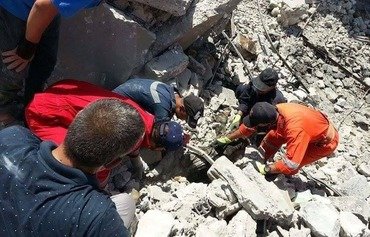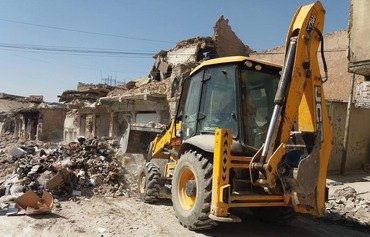Mosul's local government has embarked on a campaign to complete the grisly task of removing the last human remains of "Islamic State of Iraq and Syria" (ISIS) fighters from beneath the rubble in the Old City.
Hundreds of ISIS elements were buried under the rubble of homes and government buildings as Iraqi forces battled to wrest the western side of the city from the group's hands in July 2017.
Last week, a final push to "erase the last traces of ISIS in Mosul" began, Mosul mayor Zuhair al-Araji told Diyaruna.
Work is being carried out by a military engineering team, in co-operation with the municipality, civil defence and the forensic medicine and health departments, he said.
![Iraqi forces launched in the 2nd week of December a new campaign to erase the last traces of ISIS in Mosul, including all unexploded ordnance, as shown in this photo. [Photo courtesy of Laeth al-Rashdy]](/cnmi_di/images/2018/12/13/15772-mosul-ordnance-isis-600_384.jpg)
Iraqi forces launched in the 2nd week of December a new campaign to erase the last traces of ISIS in Mosul, including all unexploded ordnance, as shown in this photo. [Photo courtesy of Laeth al-Rashdy]
"All ISIS corpses were removed in previous cleanup campaigns," al-Araji said, noting that what remains is body parts that are under the rubble in some areas.
The new campaign is the last in a series of efforts to remove the remains, this time targeting al-Maidan and al-Tawalib areas in the Old City.
Previous campaigns finished removing human remains from al-Farouq, al-Bab al-Jadid, Ras al-Jada and al-Nabi Sheet and other parts of the Old City.
"We are determined to complete the job fully and cleanse the city of the remains of the corpses," said al-Araji.
After the conclusion of the campaign, a specialised team will conduct a full survey of the area to determine whether the situation requires additional attention, he said. The team is required to submit its report within one month.
Demand for support
The removal of human remains cannot be completed without a parallel effort to remove the rubble, which requires tremendous physical effort and financial support, al-Araji said.
The work is fraught with security risks due to the presence of mines and unexploded ordnance, he added.
During the first two days of the campaign, he said, the teams found more than a dozen explosive belts that had belonged to ISIS elements, along with 100 projectiles of various types and sizes.
"This underscores the great need for support from the government and international organisations," he said, noting that these efforts are costly as there are tonnes of rubble that need to be safely removed.
This requires bulldozers, specialised workers and military teams to handle the unexploded ordnance, he said.
Additional assistance is needed to ensure that stones of historic importance are retained and do not suffer further damage, he added.
Volunteers and municipal departments are not capable of carrying out this type of work on their own, al-Araji said, as their role is limited to sweeping the streets and lifting light-weight rubble.
Health risks
Health and environmental risks and social and psychological distress will continue to plague the city until the human remains are entirely cleared away, said Faten al-Hilfi of the Iraqi High Commission for Human Rights.
Decomposing corpses pose "risks to the environment, soil and water", she told Diyaruna, adding that the possibility that civilian corpses also remain trapped beneath the rubble has been an added source of public distress.
Al-Hilfi called for increased government support for the Office of the UN High Commissioner for Human Rights (OHCHR) to enable it to continue its work of searching for and removing corpses in co-operation with the Mosul authorities.
"The support of residents is greatly needed at this stage in terms of reporting sightings of ISIS corpses," said Ninawa provincial council security committee member Mohammed Ibrahim.
Government agencies are working to remove the remains, he said, "but finding those remains in the middle of the rubble also requires that someone guide the specialists to them, and this is the role that residents can play".
He warned people not to approach any suspected corpse or human remains for fear it might be booby-trapped or that explosives or life-threatening material might be nearby.

![Remains of ISIS corpses still lie under the rubble in some areas of Mosul's Old City. [Photo courtesy of Laeth al-Rashdy]](/cnmi_di/images/2018/12/13/15771-mosul-isis-remains-600_384.jpg)





